Health Care SOS: Sharing on Sustainability
Contact Information
Center for the Environment and Health
55 Fruit Street
Boston, MA 02114
Email: ceh@mgh.harvard.edu
 Health Care SOS is a podcast that is devoted to discussing and addressing health care sustainability, produced by the Center for the Environment and Health at Massachusetts General Hospital.
Health Care SOS is a podcast that is devoted to discussing and addressing health care sustainability, produced by the Center for the Environment and Health at Massachusetts General Hospital.
About the Podcast
The United States health care system contributes substantially to the nation’s greenhouse gas emissions.
The Health Care SOS podcast was created by the Center for the Environment and Health at Massachusetts General Hospital. Produced by the very experts leading health care today, it is devoted to discussing and addressing topics related to health care sustainability.
The goals of the Health Care SOS podcast are to share the ways in which Mass General is integrating environmental sustainability into the clinical, research and educational activities of the hospital, and to provide tools and knowledge to support other health care institutions to do the same.
Season 1
Episode 1: Creating a Sustainability Team
About the Episode
Environmental sustainability, as it pertains to the health care system, is a topic of increasingly recognized importance. In this episode, our guest Jonathan Slutzman, MD, director of the Center for the Environment and Health at Mass General, discusses the process of creating a hospital-based sustainability program as well as the clinical, financial and environmental benefits of its practices. He also suggests key steps for other institutions to consider when developing similar programs.
About the Guest
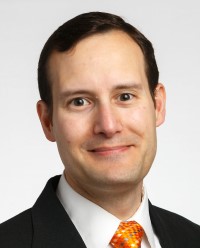 Jonathan E. Slutzman, MD, is the director of the Center for the Environment and Health and the medical director for environmental sustainability at Mass General. He holds a Bachelor of Science in Engineering in Civil and Environmental Engineering from Princeton University, an intern engineer certificate from the State of New York and a medical degree with distinction in disaster medicine from the Albert Einstein College of Medicine. Prior to a career in medicine, Dr. Slutzman was a consulting environmental engineer, completing projects in a variety of areas within environmental, health and safety assessment. These included industrial facility audits, commercial and industrial site assessments, environmental life-cycle impact assessments and disaster management exercises. He has completed work on medicine and nuclear war, suburban flood hydrology, health care cost modeling and environmental life-cycle assessment of health care processes. His academic focus is on the costs, both financial and environmental, of health care. He is a founding member and chair of the Mass General Brigham Clinician Sustainability Group, a past chair of the Society for Academic Emergency Medicine Climate Change and Health Interest Group, on the advisory committee of the Health Care Without Harm Physician Network and a founding member of the Mass General Executive Sustainability Committee.
Jonathan E. Slutzman, MD, is the director of the Center for the Environment and Health and the medical director for environmental sustainability at Mass General. He holds a Bachelor of Science in Engineering in Civil and Environmental Engineering from Princeton University, an intern engineer certificate from the State of New York and a medical degree with distinction in disaster medicine from the Albert Einstein College of Medicine. Prior to a career in medicine, Dr. Slutzman was a consulting environmental engineer, completing projects in a variety of areas within environmental, health and safety assessment. These included industrial facility audits, commercial and industrial site assessments, environmental life-cycle impact assessments and disaster management exercises. He has completed work on medicine and nuclear war, suburban flood hydrology, health care cost modeling and environmental life-cycle assessment of health care processes. His academic focus is on the costs, both financial and environmental, of health care. He is a founding member and chair of the Mass General Brigham Clinician Sustainability Group, a past chair of the Society for Academic Emergency Medicine Climate Change and Health Interest Group, on the advisory committee of the Health Care Without Harm Physician Network and a founding member of the Mass General Executive Sustainability Committee.
Resources and References
1. Duhaime A, LaRocque R, Slutzman J. Development of a Center for the Environment and Health at a Large Academic Medical Center. Journal of Climate Change and Health. 2021 October. DOI: 10.1016/j.joclim.2021.100069Episode 2: Performing a Waste Audit
 About the Episode
About the Episode
In this episode, we discuss why waste audits are useful. We review the planning and the logistics involved with conducting a hospital waste audit. Our guests include hospitalists that led a 24-hour waste audit on a 20-bed inpatient unit at MGH, and the director of the Environmental Services Department at MGH.
About the Guests
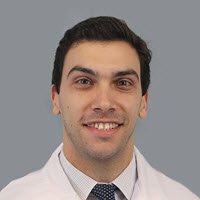 Dr. Jonathan Eisen is an academic hospitalist at Massachusetts General Hospital. He received his medical degree from the Icahn School of Medicine at Mount Sinai and completed internal medicine training at Tufts Medical Center. He is also involved in medical education at MGH and Harvard Medical School. As an associate at the MGH Center for the Environment and Health, he has pursued a focus on improving health care sustainability, particularly in the inpatient setting.
Dr. Jonathan Eisen is an academic hospitalist at Massachusetts General Hospital. He received his medical degree from the Icahn School of Medicine at Mount Sinai and completed internal medicine training at Tufts Medical Center. He is also involved in medical education at MGH and Harvard Medical School. As an associate at the MGH Center for the Environment and Health, he has pursued a focus on improving health care sustainability, particularly in the inpatient setting.
 Dr. Christian Mewaldt is an academic hospitalist at Massachusetts General Hospital. He is an associate at the MGH Center for the Environment and Health and has dedicated his extraclinical efforts to improving health care sustainability by reducing waste production and through teaching about the intersection of climate change and health.
Dr. Christian Mewaldt is an academic hospitalist at Massachusetts General Hospital. He is an associate at the MGH Center for the Environment and Health and has dedicated his extraclinical efforts to improving health care sustainability by reducing waste production and through teaching about the intersection of climate change and health.
 Ms. Latoya P. Brewster is the director of the MGH Environmental Services Department, leading a 500+ member team. She is the Chair of the Association of MGH Multicultural Professionals (AMMP) which is the largest employee resource group at MGH and a member of the Association for the health care environment (AHE). She received her master’s degree in health care administration from Simmons University and a Bachelor of Science degree from the University of Massachusetts Amherst.
Ms. Latoya P. Brewster is the director of the MGH Environmental Services Department, leading a 500+ member team. She is the Chair of the Association of MGH Multicultural Professionals (AMMP) which is the largest employee resource group at MGH and a member of the Association for the health care environment (AHE). She received her master’s degree in health care administration from Simmons University and a Bachelor of Science degree from the University of Massachusetts Amherst.
 Dr. Jonathan E. Slutzman, MD is the Director of the Center for the Environment and Health and the Medical Director for Environmental Sustainability at MGH. He holds a BSE in Civil and Environmental Engineering from Princeton University, an Intern Engineer certificate from the State of New York, and an MD with distinction in disaster medicine from the Albert Einstein College of Medicine. Prior to a career in medicine, Dr. Slutzman was a consulting environmental engineer, completing projects in a variety of areas within environmental, health, and safety assessment. These included industrial facility audits, commercial and industrial site assessments, environmental life-cycle impact assessments, and disaster management exercises. He has completed work on medicine and nuclear war, suburban flood hydrology, health care cost modeling, and environmental life-cycle assessment of health care processes. His academic focus is on the costs, both financial and environmental, of health care. He is a founding member and chair of the Mass General Brigham Clinician Sustainability Group, a past chair of the Society for Academic Emergency Medicine Climate Change and Health Interest Group, on the advisory committee of the Health Care Without Harm Physician Network, and a founding member of the MGH Executive Sustainability Committee.
Dr. Jonathan E. Slutzman, MD is the Director of the Center for the Environment and Health and the Medical Director for Environmental Sustainability at MGH. He holds a BSE in Civil and Environmental Engineering from Princeton University, an Intern Engineer certificate from the State of New York, and an MD with distinction in disaster medicine from the Albert Einstein College of Medicine. Prior to a career in medicine, Dr. Slutzman was a consulting environmental engineer, completing projects in a variety of areas within environmental, health, and safety assessment. These included industrial facility audits, commercial and industrial site assessments, environmental life-cycle impact assessments, and disaster management exercises. He has completed work on medicine and nuclear war, suburban flood hydrology, health care cost modeling, and environmental life-cycle assessment of health care processes. His academic focus is on the costs, both financial and environmental, of health care. He is a founding member and chair of the Mass General Brigham Clinician Sustainability Group, a past chair of the Society for Academic Emergency Medicine Climate Change and Health Interest Group, on the advisory committee of the Health Care Without Harm Physician Network, and a founding member of the MGH Executive Sustainability Committee.
Resources and References
1. Grand Rounds Webinar “Inpatient Medicine Waste Audit and the Plastic Pandemic”
2. Hsu S, Thiel C, Mello M, Slutzman J. Dumpster Diving in the Emergency Department: Quantity and Characteristics of Waste at a Level 1 Trauma Center. Western Journal of Emergency Medicine: Integrating Emergency Care with Population Health. 2020; DOI: 10.5811/westjem.2020.6.47900
Episode 3: Research: Publishing Climate Change and Health Research, and Greening Research Labs
 About the Episode
About the Episode
In this episode, Dr. Duhaime discusses the history of the Journal of Climate Change and Health and opportunities related to publications. She then discusses the environmental impact of research, introduces steps that researchers can consider in greening their labs, and describes the consult service created at MGH to help investigators with these efforts.
About the Guest

Dr. Ann-Christine Duhaime is the Nicholas T. Zervas Distinguished Professor of Neurosurgery at Harvard Medical School and was Director of Pediatric Neurosurgery at the Massachusetts General Hospital (MGH) from 2010-2021. She has been a practicing pediatric neurosurgeon for over three decades, and her neuroscience research focuses on the mechanisms, pathophysiology, imaging, and treatment of injury in the immature brain, focusing on translational and clinical research to study injuries occurring in infants and young children, including those seen commonly in child abuse. The work also investigates plasticity, recovery, and return of brain function in children and adolescents through the stages of maturation.
Dr. Duhaime also has a longstanding interest in the relationship between brain and behavior, and in environmental issues. She is an Associate Director of the MGH Center for the Environment and Health, is a Faculty Associate of the Harvard University Center for the Environment, and she serves as the Associate Editor-in-Chief of the Journal of Climate Change and Health. In 2016 she spent a year as a Fellow at the Radcliffe Institute for Advanced Study at Harvard University where she studied the neurobiology of reward circuitry and plasticity and its relevance to pro-environmental behavior, and she has been working with a diverse team to design a prototype advanced “green” biophilic pediatric hospital. Her book on this work, Minding the Climate: How Neuroscience Can Help Solve our Environmental Crisis, will be published by Harvard University Press in 2022.
Resources and References
1. The Journal of Climate Change and Health2. Greening the Lab Tip Sheet (PDF)
Episode 4: Nurses and Other Health Professionals: Climate Change Education and Mentorship
 About the Episode
About the Episode
In this episode, Dr. Patrice Nicholas discusses educating nurses and other health professionals about climate change and their role in: educating patients; mitigating the effects of climate change; scholarship and collaboration; and getting involved at the community level.
About the Guest
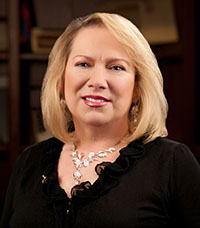 Patrice K. Nicholas, DNSc, DHL (Hon), MPH, MS, RN, NP-C, FAAN
Patrice K. Nicholas, DNSc, DHL (Hon), MPH, MS, RN, NP-C, FAAN
Dr. Patrice K. Nicholas is distinguished teaching professor and director of the Center for Climate Change, Climate Justice, and Health at the MGH Institute of Health Professions and co-director for Policy and Advocacy at the Massachusetts General Hospital Center for the Environment and Health. She completed a Bachelor of Science degree in Nursing at Fitchburg State University, and both a Master of Science in Nursing degree and Doctor of Nursing Science degree at Boston University. From 1996 to 1999, she was a postdoctoral fellow at the Harvard T. H. Chan School of Public Health focusing her research on symptom management in HIV disease and global health and completed a Master of Public Health degree in International Health. In May 2010, Dr. Nicholas received a Doctor of Humane Letters degree honoris causa from Fitchburg State University. In 2007, she was selected as a Fulbright Senior Scholar at the University of KwaZulu-Natal focusing on adherence to HIV and TB medications. In 2008, she was inducted as a fellow of the American Academy of Nursing. From 2006- 2019, Dr. Nicholas served as director of Global Health and Academic Partnerships at the Brigham and Women’s Hospital, where she also co-led the efforts in their successful American Nurses Credentialing Center Magnet journey. She has authored/co-authored over 100 peer-reviewed manuscripts, two texts, and many invited and peer-reviewed presentations including several manuscripts on climate change, climate justice and climate-related health consequences. In summer 2023, Dr. Nicholas will be a visiting fellow at the University of Oxford at the Harris Manchester College Summer Research Institute.
Resources and References
- Center for Climate Change, Climate Justice, and Health at MGH Institute of Health Professions
- National League for Nursing
- Alliance of Nurses for Healthy Environments (ANHE)
- Planetary Health Alliance at Harvard
- Yale School of Public Health's Climate Change and Health Certificate
- C-Change Center for Climate, Health, and the Global Environment
- Climate Optimist (newsletter)
- Climate Health Organizing Fellows Program
Episode 5: Preparing for Climate Change and Disasters: What Health Care Systems Need to Do Differently
 About the Episode
About the Episode
In this episode, Dr. Paul Biddinger discusses the critical need to plan our health care system around climate change and its consequences. He reviews a multidisciplinary approach, initial steps and aspects to consider, as well as obstacles to disaster preparedness.
About the Guest
 Paul D. Biddinger, MD, FACEP
Paul D. Biddinger, MD, FACEP
Dr. Paul Biddinger is the Chief Preparedness and Continuity Officer at Mass General Brigham in Boston. He holds the Ann L. Prestipino MPH Endowed Chair in Emergency Preparedness and is also the Director of the Center for Disaster Medicine at Massachusetts General Hospital (MGH). Dr. Biddinger additionally serves as the Director of the Emergency Preparedness Research, Evaluation and Practice (EPREP) Program at the Harvard T. H. Chan School of Public Health and holds appointments at Harvard Medical School and at the Chan School. Dr. Biddinger serves as a medical officer for the MA-1 Disaster Medical Assistance Team (DMAT) in the National Disaster Medical System (NDMS) in the US Department of Health and Human Services (HHS).
Dr. Biddinger is an active researcher in the field of emergency preparedness and has lectured nationally and internationally on topics of preparedness and disaster medicine. He has authored numerous articles and book chapters on multiple topics related to disaster medicine and emergency medical operations and has responded to numerous prior disaster events, including Hurricane Katrina, Superstorm Sandy, the Boston Marathon bombings, the Nepal earthquakes, and many others.
He completed his undergraduate study in international relations at Princeton University, attended medical school at Vanderbilt University, and completed residency training in emergency medicine at Harvard.
Resources and References
- U.S. Climate Resilience Toolkit
- MGH CEH Grand Rounds July 20, 2022: Climate Change and Disasters: What the Healthcare System Needs to Do Differently
Episode 6: Anesthesia and the Environment: Mitigation Steps with Real Impact
 About the Episode
About the Episode
In this episode, Dr. Sam Smith discusses the action that he and his multidisciplinary team have taken to reduce the carbon footprint of anesthesia at Mass General Hospital.
About the Guest
 Samuel Smith, MD, MPH
Samuel Smith, MD, MPH
Dr. Smith is a Staff Anesthesiologist at MGH. After obtaining his MD and an MPH at the University of Utah, he completed his residency at Harvard / MGH in 2004. He subsequently practiced in various US locations, served as President of an Anesthesia group in California, and then returned to MGH to pursue teaching and innovation in 2019 and is an Instructor in Anesthesia at the Harvard Medical School. He serves as an Associate to the MGH Center for the Environment and Health, is a member of Healthcare without Harm, contributes to the Journal of Climate Change and Health as a Review Editor, and spends much time teaching new Resident physicians about sustainability and the impact of practice choices.
Resources and References
Episode 7: A Call to Action
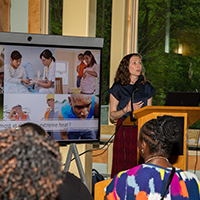 About the Episode
About the Episode
In this episode, we are joined by Dr. Melanie Haines, who is an endocrinologist in the Neuroendocrine Unit at Massachusetts General Hospital. Dr. Haines has always been passionate about environmental conservation. But she felt a new call to action after a patient of hers was admitted to the hospital with a serious medical condition exacerbated by an extreme heat event in Boston, 2021. Dr. Haines shares how she took this call to action and transformed it into a project to address environmental injustice, with guidance from mentors, funding from an MGH Department of Medicine Community Scholar Award, and a partnership with Boston-based organization called CREW. This partnership hosted three summer 2022 community events to provide local residents education and resources, including air conditioning units, in an effort to prevent heat-related illness.
About the Guest
 Melanie S. Haines, MD
Melanie S. Haines, MD
Melanie S. Haines, MD is an endocrinologist in the Neuroendocrine Unit at Massachusetts General Hospital, an Assistant Professor of Medicine at Harvard Medical School, and an Associate at the MGH Center for the Environment and Health. Dr. Haines completed medical school at the Johns Hopkins University School of Medicine, her internal medicine residency at Brigham and Women's Hospital, and her endocrinology fellowship at Massachusetts General Hospital.
Resources and References
Season 2
Episode 1: Calling all trainees: Integrating climate curricula and getting involved during residency
 About the Episode
About the Episode
Pollution and the climate crisis are having enormous impact on the health of our patients. But are we teaching our future physicians how to recognize, manage, or prevent these consequences? Dr. Jake Fox, a third-year internal medicine resident at Massachusetts General Hospital, discusses how he pushed for more education on these issues, and other ways he is trying to make a difference.
About the Guest

Jake Fox, MD, MPH
Jake Fox, MD, MPH, is a third-year internal medicine resident at Massachusetts General Hospital in Boston. Prior to residency, he studied at the University of Colorado, where he earned his MD and an MPH in epidemiology. His current research interests include chronic kidney disease of unknown origin and the effects of air pollution on cardiopulmonary disease. Outside of work, Jake enjoys reading fiction, trail running, and riding his bike just about everywhere.
Resources and References
- Climate Resources for Health Education
- Medical Students for a Sustainable Future
- Planetary Health Report Card
- Climate Code Blue
- Attention Humans Podcast
- Fox, J., Kuczmarski, T., Hampshire, K., Chang, L. Interviewed on NEJM Clinical Curbsides Podcast: “Climate Change and Health Education” (2022). Featured on NEJM Resident 360 website.
- Harvard Medical School Grand Rounds with John Kerry Sept, 2021
- Thomas M. Kuczmarski, Jacob Fox, Ethan Katznelson, Durga Thakral, Khin-Kyemon Aung, Emily Moore, Jonathan Eisen, Jonathan E Slutzman, Regina LaRocque, Caren G Solomon, Gregg L Furie, Paul F Dellaripa, Climatizing the internal medicine residency curriculum: A practical guide for integrating the topic of climate and health into resident education, The Journal of Climate Change and Health, Volume 4, 2021, 100067, ISSN 2667-2782, https://doi.org/10.1016/j.joclim.2021.100067.
Episode 2: Perioperative Sustainability: Operating room waste reduction initiatives at Mass General Hospital

About the Episode
In the United States, it is estimated that operating rooms contribute approximately 30% of the 5 million tons of waste generated by hospitals each year. And of that OR waste, about 20% comes from blue wrap. In this episode, Barbara Belanger, a perioperative nurse at Massachusetts General Hospital discusses some key initiatives around her OR: blue wrap recycling and food waste diversion.
About the guest
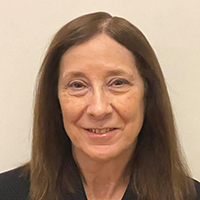
Barbara Belanger
Barbara Belanger is a perioperative clinical nurse at Massachusetts General (MGH) and a member of the MGH Center for the Environment and Health. Dr. Belanger completed her Doctorate of Nursing Practice at Northeastern University in 2021 and the Yale School of Public Health’s Climate Change and Health Certificate Program in 2022. Dr. Belanger is a member of Practice Greenhealth, Alliance of Nurses for a Healthy Environment, Health Care Without Harm, and New Hampshire Healthcare Workers for Climate Change. Dr. Belanger contributed to the in development of the interdisciplinary MGH Perioperative Sustainability Committee in 2017. As chair, Dr. Belanger partners with MGH leaders to promote healthcare sustainability with a focus on plastic medical waste reduction. Dr. Belanger’s work to promote a nurse-led initiative for recycling received a Clinical Excellence award at the AORN Global Conference and OR Manager Conference in 2019.
Resources and References
Episode 3: Symbiosis: Working with College Students in Healthcare Sustainability

About the Episode
In this podcast episode, we are going to chat with two college students, Sara Weinberg and Cole Peterson, to share as case examples about the mutually beneficial relationships and opportunities for growth that can come from working together at an academic medical center on healthcare sustainability.
About the guests

Sara Weinberg
Sara Weinberg is a senior at Boston University studying media science and public health. She recently interned with the Massachusetts General Hospital Center for the Environment and Health where she was first introduced to the climate health and healthcare sustainability fields. She is also a research assistant at Boston University's Communications Research Center, where she is studying online climate change misinformation and ways to protect the public against climate misinformation attacks. Sarah is passionate about using strategic communications as a tool to share climate and environmental health resources and improve climate and health literacy. Outside of academics, Sara enjoys hiking the national parks, taking yoga classes, and cooking vegetarian recipes.

Cole Petersen
Cole Petersen is a senior at Harvard College studying Neuroscience with a secondary in Environmental Science and Public Policy. Coming from Snowmass Village, Colorado, Cole has always had a great appreciation for nature and a strong desire to protect it. As the outgoing President of Harvard’s Green Medicine Initiative, he is dedicated to exploring and influencing the intersection of health and the environment, with a particular interest in sustainability in healthcare spaces. Among other commitments, Cole has been heavily involved in environmental groups on Harvard’s campus. He served as First Year Representative for the Zero Waste Team, worked as a house REP for Harvard’s Office for Sustainability, and this year collaborated with other campus groups to co-found the new Harvard Climate Coalition. Cole hopes to continue combining his joint passions for medicine and the environment as he pursues medical school to become a pediatric neurologist serving rural communities.
Resources and References
Episode 4: Opportunities in Radiology

About the Episode
In this episode we speak with Dr. Mike Zalis, the Director of the newly formed Mass General Brigham Radiology Center for Sustainability, about the center's mission and opportunities for climate-smart healthcare in radiology.
About the guests

Mike Zalis, MD
Mike Zalis, MD, is the Director of the MGB Radiology Center for Sustainability and also a practicing senior faculty member in the Cardiovascular and Interventional Radiology divisions of MGH Radiology. Dr. Zalis has a background in computing and biophysics. Early volunteer experiences in southern Africa and the Navajo reservation set him on a path into medicine, which he blended with his more technical tendencies to eventually land in imaging and interventional radiology. He completed his training at MGH and has been on the faculty since 2000. Mike has led a number of grant-supported clinical research programs and along the way also helped to co-found a work-flow and data science company which spun out of MGH (“QPID Health, Inc”), where he served as chief medical officer. Now returned to full-time at MGH, he is helping to drive an integrated program of education, research, and operational innovation aimed to align Imaging practice with netZero 2040 and other sustainability goals.
Resources and References
Episode 5: Hospital carbon footprint: conducting an emissions inventory

About the Episode
In 2022, 102 organizations representing 837 hospitals signed the White House Health Sector Climate Pledge. In addition to the private sector, federal systems are working to meet similar goals. Over 15% of U.S. hospitals have committed to cutting carbon emissions with a net zero goal. Taking inventory of one’s carbon footprint is one of the earliest steps to achieve this ambitious but necessary net zero target. In this podcast episode, we discuss what conducting a carbon emission inventory entails.
About the guest

Joe Bialowitz
Joe Bialowitz is a director at Guidehouse and leads the firm’s healthcare-specific sustainability services. He helps payers, providers, and other organizations navigate climate-driven complexities and improve business resiliency by designing science-aligned roadmaps to eliminate avoidable pollution; as well as by identifying and managing risks to clinical quality, cost structures, and revenue streams associated with climate-related effects on patients, employees, facilities, and supply chains. A globally recognized expert in decarbonizing the healthcare sector, Mr. Bialowitz spent 14 years at Kaiser Permanente overseeing strategies that resulted in the organization’s achievement of carbon neutrality across all operations in 2020. He holds a Master of Science degree in Environmental Management from Vrije Universiteit Amsterdam, a Master of Science degree in Urban Planning from Columbia University, and a Bachelor of Arts degree in Political Science from Stanford University.
Resources and References
- https://www.hhs.gov/climate-change-health-equity-environmental-justice/climate-change-health-equity/actions/health-sector-pledge/index.html
- https://guidehouse.com/
- https://ghgprotocol.org/
- https://www.energystar.gov/buildings/benchmark
- https://healthcareghg.org
- https://practicegreenhealth.org/tools-and-resources/health-care-emissions-impact-calculator
Episode 6: A Recipe for Climate Advocacy in the Health Care System
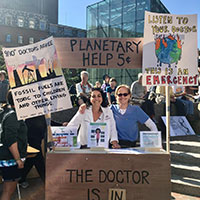
About the Episode
In this podcast episode, you’ll hear from Dr. Elizabeth Pinsky, a pediatrician and child psychiatrist. She shares her perspectives about climate activism and advocacy, and a recipe for how to incorporate this important work into professional life in the healthcare system.
About the guest
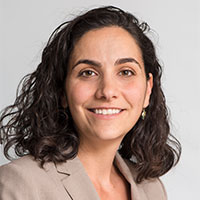
Elizabeth Pinsky, MD
Elizabeth Pinsky, MD, is a child and adolescent psychiatrist and pediatrician at Massachusetts General Hospital, where she is the Associate Director of the Pediatric Psychiatry Consultation Service, and at Shriners Hospital for Children Boston. Her clinical interests focus on the intersection of child mental and physical health, including childhood trauma associated with medical care, fostering resilience in medically ill children, and other psychiatric aspects of pediatric medical illness. She believes that climate change poses the most urgent threat to children at that intersection of physical and mental health, and that clinicians caring for children must advocate for a rapid and just transition off fossil fuels. She serves as the Associate Director for Advocacy at the MGH Center for Environment and Health and is also a founding member of Climate Code Blue, a Boston-area climate action group for physicians and other health professionals.
Resources and References
Episode 7: From Scrub Caps to Sustainability: A Surgical Resident's Reflections

About the Episode
In this podcast episode, Dr. Divyansh Agarwal shares his perspectives on climate change and bringing sustainability to the operating room. He also discusses his recent work related to the life cycle assessment of reusable vs. single use scrub caps.
About the guest

Divyansh Agarwal, MD, PhD
Dr. Divyansh Agarwal graduated cum laude and Phi Beta Kappa with exceptional distinction from Yale University in 2015, earning both a B.S. and an M.S., as well as being designated a Yale Journalism Scholar. For his computational research, he won Yale’s Edgar J. Boell and the William R. Belknap Prizes. He was also awarded the 2015 Thomas J. Bardos Science Education Award by the American Association for Cancer Research as well as the 2014 Michael Manzella Foundation Cancer Research Fellowship. He then completed a Medical Scientist Training Program (MSTP) at the University of Pennsylvania, graduating with his MD in 2021. While at Penn, Dr. Argawal earned a PhD in Computational Biology, and was the inaugural Blavatnik Foundation Family Fellow in Biomedical Research at Penn. He built on his passion in science communication, medical education, and entrepreneurship. Dr. Agarwal won numerous awards for his intellectual contributions to the scientific community by the time he graduated from the Perelman School of Medicine, including the Clyde F. Barker Research Prize, Dr. David B.P. Goodman Research Award, and the Russell J. Stumacher, MD Memorial Prize in Medical Arts and Letters. Dr. Agarwal is currently a general surgery resident at the Massachusetts General Hospital, and a postdoctoral affiliate at the Massachusetts Institute of Technology. As a surgeon-scientist, he has led local initiatives to foster sustainability in surgery, and his recent work is supported by a Blair and Georgia Sadler Fellowship at Health Care Without Harm.
Resources and References
- Agarwal D, Bharani T, Mullen JT. Personalized Scrub Caps for Identification of Surgical Trainees. JAMA Netw Open. 2023 Sep 5;6(9):e2332403. doi: 10.1001/jamanetworkopen.2023.32403. PMID: 37676664; PMCID: PMC10485725
- Agarwal D, Bharani T, Armand W, Slutzman JE, Mullen JT. Reusable scrub caps are cost-effective and help reduce the climate footprint of surgery. Langenbecks Arch Surg. 2023 Sep 14;408(1):358. doi: 10.1007/s00423-023-03107-9. PMID: 37707671.
- Agarwal D., What's in a name? Identity, it turns out. CMAJ. 2022 Jun 6;194(22):E777-E778. doi: 10.1503/cmaj.220298. PMID: 35667668; PMCID: PMC9177209
- Bharani, T., Achey, Jamal, H. Cherry, A., Robinson, MK., Maddern, G., Tobias, DK., Agarwal, D., Impact of Climate Change on Surgery: A Scoping Review to Define Existing Knowledge and Identify Gaps,The Journal of Climate Change and Health , 2023, 100285, ISSN 2667-2782
- Open LCA
Related Podcasts
How Is Climate Change Related to the Human Brain?
Produced by: Charged, the Mass General podcast
Speaker:
- Ann-Christine Duhaime, MD, associate director of the Center for the Environment and Health and Nicholas T. Zervas Distinguished Professor of Neurosurgery at Harvard Medical School
Climate Change, Health and Education
Produced by: NEJM Resident 260
Speakers:
- Jake Fox, MD, MPH, Mass General internal medicine resident and associate of the Center for the Environment and Health
- Thomas Kuczmarski, MD, internal medicine resident at Brigham and Women’s Hospital
- Karly Hampshire, MD, medical student at UCSF
Meet Our Host
Wynne Armand, MD

Host and Editor, Health Care SOS
Associate Director, Mass General Center for the Environment and Health
Primary Care Physician, Mass General Chelsea HealthCare Center
Wynne Armand, MD is the associate director for education and engagement at the Mass General Center for the Environment and Health. Dr. Armand also serves as a primary care physician at Mass General Chelsea HealthCare Center, where she provides comprehensive preventive care, chronic disease management and urgent care to adult patients in a diverse, urban setting.
Dr. Armand is a faculty editor for Primary Care Office Insite (PCOI), a decision-support tool that facilitates day-to-day practice for primary care teams at Mass General and across Mass General Brigham. She is a contributing author for the Harvard Health Blog where she writes on a variety of health topics and perspectives on medical news.
She is an associate physician at Mass General, an assistant professor at Harvard Medical School and board-certified in Internal Medicine.
Prior to coming to Mass General, she trained at the University of California at San Francisco in a program focused on providing care to the under-resourced.
Download and Listen
Listen to the podcast on the following apps:
Our Commitment to Sustainability
As a major Boston academic medical center, Mass General recognizes its responsibility to prioritize sustainable practices.
Our Commitment to Sustainability
We strive to integrate sustainability into our clinical, research and educational activities, and to improve the environmental health of the hospital, as well as the health and wellbeing of the communities we serve.
